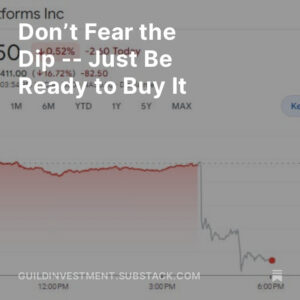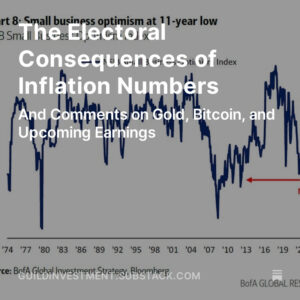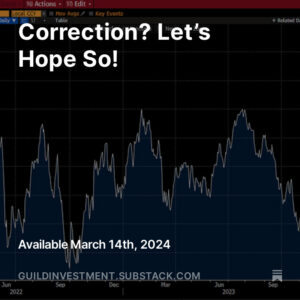Market Summary
The U.S. Economy – The Tax Bill good for U.S. Economy and Good for U.S. Stock Market
Readers know that we are bullish on the U.S. economic outlook. The passage of the tax bill will create further impetus for economic growth in the U.S. We will not be surprised to see quarterly growth at 4% or above within a few quarters. Such strong economic growth, which will be a welcome relief from years of slow growth in the U.S., will provide a base upon which corporate profits can continue to grow.
The U.S. Stock Market Will Continue To Do Well In 2018
Our stock market model indicates that we will see corporate profit growth of 10–12 % in 2018. Assuming that price-to-earnings ratios stay the same as they currently are, we anticipate a continued growth in stock market values over the next 12 months. In our letter in coming weeks we will discuss the effects of the tax bill on different industries, and which ones will be benefitted most by the competitive benefits of lower taxes.
U.S. Companies That Sell to the U.S. Market Are the Big Beneficiaries of the Tax Bill
Companies who are domestic and pay a full 35% federal tax rate plus state taxes will be most benefitted. They will now, for the first time, pay a corporate tax rate that is the same as the average that companies in the industrialized world pay. These companies are primarily domestic companies in retail, manufacturing, regional banking, insurance, technology, and software, medical equipment and services and consumer discretionary industries. These are the companies that we suggest that investors focus on. Until now they have been paying a tax rate far in excess of world tax rates, which has given them less capital to expand and to enter new and more profitable niches.
Europe
We are somewhat bullish on Europe in spite of the continent’s backward-looking economic business traditions. The European economy is growing much more slowly than the U.S., and this is primarily due to the fact that disruption is not allowed to blossom as much in Europe as it has in the U.S. New industries and economic growth are created through disruption.
Alphabet [NASDAQ: GOOG], Apple [NASDAQ: AAPL], Facebook [NASDAQ: FB], Walmart [NYSE: WMT], PayPal [NASDAQ: PYPL], Tesla [NASDAQ: TSLA], Amazon [NASDAQ: AMZN], and many more of the successful U.S. innovators of the last 15 years have been disruptors who have successfully defeated their incumbent competitors.
Europe tries to stop this by catering to the established companies and creating laws that make it hard for new and better technologies to unseat old technologies and companies. In spite of that, global economic growth and some new technologies coming from Europe have created some opportunities in Europe for 2018. We are focusing on Germany, Holland, Scandinavia, and eastern Europe (see above.)
Asia
Within Asia we are bullish on Vietnam, Thailand, and Japan. Vietnam has claimed much of the low-cost manufacturing that has left China as wages and costs have risen. Thailand is the workshop for Japan; many Japanese cars and other products are made in Thailand. Japan is a beneficiary of continuing QE, and will benefit from higher exports, but only if the U.S. dollar rises versus the Japanese Yen.
Gold
Gold has been in a trading range for months. We are not bearish on gold, and believe that with the arrival of slightly higher inflation in much of the world in 2018, gold can rise by 10 or 15%. We do not see radically higher inflation, just a gradual rise of about 1–2% from current levels in much of the world.
Bitcoin and Other Digital Currencies
We have mentioned digital currencies (also called “cryptocurrencies”) in our letters for the last few months. For new readers who are unfamiliar with digital currencies, here’s a brief summary. These currencies are digital tokens which exist only in cyberspace. In theory, their quantities are limited and controlled by computer algorithms which cannot be altered, and ownership is recorded in a digital ledger which is shared across thousands of computer systems and cannot be changed except by consensus. The first digital currency, bitcoin, was created in 2008, and it is still the most significant, claiming about half the market value of all digital currencies (that total value recently exceeded $500 billion). Early adopters may have thought that these tokens could help users evade government regulations and taxes. However, as digital currencies have become increasingly accepted in the financial mainstream, governments have made it clear that gains from these tokens are indeed taxable. Bitcoin futures contracts now trade on major exchanges, and several bitcoin ETFs are preparing for launch in 2018. The ongoing acceptance of digital currencies into the financial mainstream could help create new demand.
Our fundamental view is that digital currencies represent the early beginnings of a new asset class. As such, they have great promise, and will also likely continue to experience extreme volatility because they are still so young, growing, and untested. While digital currencies as such will not disappear, the specific digital currencies that exist today may not endure. Also, the current trading environment is largely unregulated. While the media are full of stories about bitcoin millionaires and about outlandish profits, it is likely that in the future there will also be many stories of losses, as particular digital currencies fail and disappear (indeed there are already such stories for those who will dig through the hype to find them). There are indications that parts of the digital currency markets are subject to the kind of unscrupulous manipulation that characterizes many markets in their early, unregulated days.
From a strategic perspective then, our advice is to pay attention to digital currencies and their growing pains. From a tactical perspective, our advice is to trade digital currencies using only funds that an investor would be comfortable to lose entirely. Stories are circulating about buyers mortgaging their houses to buy digital currencies; that, to us, signals the kind of irrationality that accompanies a financial mania. We caution any investors to investigate exchanges before using them; make sure that their security is adequate and that it will be quick and easy to liquidate your positions and withdraw funds when desired. We have also seen many scams being promoted which promise profits from automated digital currency trading systems; stay away from these, and if you want to speculate in digital currencies, simply trade the instruments themselves. Apply the same common sense to this domain that you would to any other speculative endeavor.
Please note that principals of Guild Investment Management, Inc. (“Guild”) and/or Guild’s clients may at any time own any of the stocks mentioned in this article, and may sell them at any time. Currently, Guild’s principals and clients own GOOG, AAPL, FB, PYPL, and AMZN. In addition, for investment advisory clients of Guild, please check with Guild prior to taking positions in any of the companies mentioned in this article, since Guild may not believe that particular stock is right for the client, either because Guild has already taken a position in that stock for the client or for other reasons.
Thanks for listening; we welcome your calls and questions.







